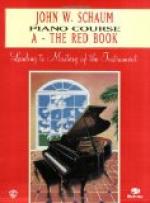“If I have spoken of the serious aims of many teachers of piano, I cannot say as much for the students: they are often superficial and want to go too quickly; they are apt to be in a hurry and want to make a show, without being willing to spend the necessary years on preparation. No art can be hurried. Students of painting, sculpture, architecture or music must all learn the technique of their art; they must all learn to go deep into the mysteries and master technic as the means to the end, and no one requires exhaustive preparation more than the executive musician. The person who would fence, box or play baseball must know the technic of these things; how much more must the pianist be master of the technique of his instrument if he would bring out the best results.
“At the very bottom and heart of this subject of mastery lies Concentration: without that, little of value can be accomplished. Students think if they sit at the piano and ‘practise’ a certain number of hours daily, it is sufficient. A small portion of that time, if used with intense concentration, will accomplish more. One player will take hours to learn a page or a passage which another will master in a fraction of the time. What is the difference? It may be said one has greater intelligence than the other. The greater the intelligence, the stronger the power of concentration.
“If a pupil comes to me whose powers of concentration have not been awakened or developed, I sometimes give him music to read over very slowly, so slowly that every note, phrase and finger mark can be distinctly seen. Not being used to thinking intently, mistakes occur, in one hand or the other, showing that the mind was not sufficiently concentrated. It is the mind every time that wins. Without using our mental powers to their fullest extent we fail of the best that is in us.
“In regard to technical equipment and routine, I do different work with each pupil, for each pupil is different. No two people have the same hands, physique or mentality; so why should they all be poured into the same mold? One student, for example, has splendid wrists and not very good fingers. Why should I give him the same amount of wrist practise that I give his brother who has feeble wrists; it would only be a waste of time. Again, a pupil with limited ideas of tonal quality and dynamics is advised to study tone at the piano in some simple melody of Schubert or Chopin, trying to realize a beautiful tone—playing it in various ways until such a quality Is secured. The piano is a responsive instrument and gives back what you put into it. If you attack it with a hard touch, it will respond with a harsh tone. It rests with you whether the piano shall be a musical instrument or not.
“A student who comes to me with a very poor touch must of course go back to first principles and work up. Such an one must learn correct movements and conditions of hands, arms and fingers; and these can be acquired at a table. Along with these, however, I would always give some simple music to play, so that the tonal and musical sense shall not be neglected.




